MacArthur ‘Genius’ Grants Are an Embarrassment
Gregory Hood, American Renaissance, October 24, 2023

Credit: © John D. and Catherine T. MacArthur Foundation. CC BY-NC 4.0 DEED.
Subscribe to future audio versions of AmRen articles here.
The John D. and Catherine T. MacArthur Foundation Fellowships were once one of the most prestigious awards a scholar could get. The so-called “genius grants” are still a nice payout; winners get $800,000 over five years to spend however they want.
Prestige is declining along with the quality of the recipients. In 2015, Ta-Nehisi Coates got a grant. He went on to complain about Donald Trump and write comic books few people bought. However, he is a genius compared to 2021 award winner Ibram X. Kendi, whose reputation is in tatters after his “Center for Antiracist Research” blew through $43 million while producing almost no research.
We don’t know what 2023’s winners will do in the years to come, but what they have been up to so far is, to put it mildly, eye-opening.
Tendayi Achiume, originally from Zambia, says her goal is to reimagine structures that help us make sense of the world we live in. She is a “legal scholar” at UCLA. If the law can be “reimagined,” there is no law.
Her main interest is “immigration as decolonization,” meaning that Third-Worlders “decolonize” their own countries by pouring into ours. She says white people caused the climate crisis and got rich exploiting everyone else. Therefore:
I argue that granting people the right to move can be a way of conferring reparations to which they’re entitled and that so much of the movement that we consider illegal economic migration is actually acts of individuals who are trying to enhance their self-determination in ways that I think should be coded as decolonial acts of political agency and economic agency as well. And what we need is laws that can recognize and protect that.
Climate change is, of course, all about race: “What you have to realize is that every action that is taken in relation to ecological crisis — environmental, climate, and otherwise — has racial justice implications, and so every action becomes a site of undoing racial subordination.”
The professor was the first woman to serve as the UN Special Rapporteur on Contemporary Forms of Racism, Racial Discrimination, Xenophobia and Related Intolerance, which means traveling around the world, looking for bad white people. One of her reports was on the “threat of nationalist populism to racial equality,” especially as it “successfully advances heteronormative, patriarchal visions of the nation and a version of ‘traditional values’ that leads to serious violations against marginalize social groups . . . .” She wants governments to outlaw “racist organizations,” of which there are many.
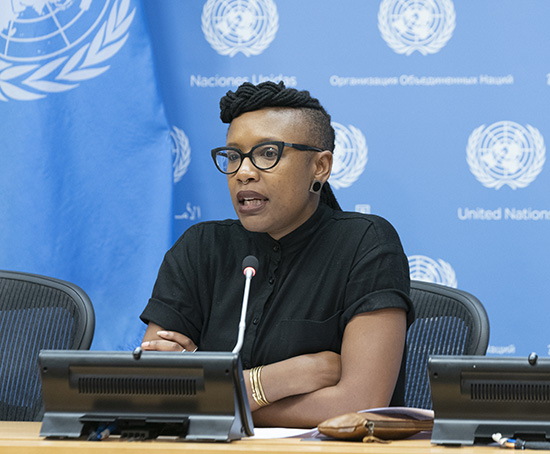
Press briefing by Tendayi Achiume at UN Headquarters. (Credit Image: © Photographer Lev Radin/Pacific Press via ZUMA Wire)
Another report called for firm action against “online hate speech ” — meaning deplatforming — and changing American laws so that “racist hate speech” no longer enjoys “the highest level of protection related to the right of freedom of expression and opinion under its constitutional law.” In a 2019 report, she called for reparations for slavery. NPR gave her a fawning interview the day the awards were announced.
Andrea Armstrong is an “incarceration law scholar.” Her “Incarceration Transparency” project tracks conditions in prison and deaths behind bars. She says prisoners are “artists, they are musicians, they are brothers and siblings and uncles and aunts.” So were their victims. Incarceration Transparency includes an online memorial for people who died in prison.
Miss Armstrong, who is black, naturally fights racism. Her November 2022 report says that Louisiana has the highest incarceration rate because of “racism and lack of accountability.” She doesn’t mention that it had the highest murder rate in America in 2020 and the second highest percentage of blacks. Racism is “itself a driver of incarceration.” Mandatory sentencing based on prior offenses, “disproportionately incarcerates Black people and depopulates Black communities.”
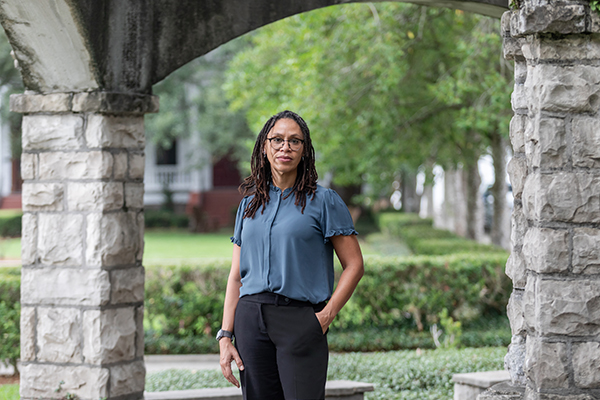
Andrea Armstrong. Credit: © John D. and Catherine T. MacArthur Foundation. CC BY-NC 4.0 DEED.
Miss Armstrong publishes in law journals. “Slavery Revisited in Legal Plantation Labor,” is against making prisoners work. She is horrified “when mothers see sons [prisoners] picking cotton on plantations much like their great-grandparents may have done.”
“Racial Origins of Doctrines Limiting Prisoner Protest Speech” argues that the “Civil Rights movement may have achieved notable gains,” but the “locus of racial control and subordination shifted to our criminal justice system.”
Ian Bassin is white. He runs “Project Democracy,” which he says fights authoritarianism, but he’s really fighting conservatives. His group has lawsuits against Florida’s Stop Woke Act, Rudy Giuliani, and Dinesh D’Souza for his “disinformation film” 2000 Mules. The group praises the use of the Ku Klux Klan Act of 1871 to sue Unite the Right organizers.
The organization wants proportional representation to defeat the “MAGAified GOP,” but there must be careful research to make sure proportional representation won’t hurt non-whites. Naturally, the project wants “voting rights activists to fundamentally rethink, and possibly reshape, American electoral structures of representation for a twenty-first century multiracial polity.”
Courtney Byran, a black woman, is a composer who combines various styles “in pieces that foreground the lived experiences of African Americans.” Her orchestral work Sanctum highlights Black Lives Matter protests after Michael Brown died. It doesn’t matter that a police officer shot Michael Brown in legitimate self-defense.
Yet Unheard is about the death of Sandra Bland, a black woman who died in police custody. There were many rumors about the case. One was that she was dead in her mug shot. Authorities released hours of video and a grand jury found no cause for action. Nonetheless, she remains a BLM martyr whom wealthy people can honor in the concert hall.
Maria Magdalena Campos-Pons, another black woman, is a “multidisciplinary artist” whose work is about — could you guess? — slavery. The New York Times explains that “The Seven Powers Come by the Sea,” represents “orishas” — African spirits that “support, replenish, and enhance the survival of Black-descended people.” That’s the artist standing in the middle.
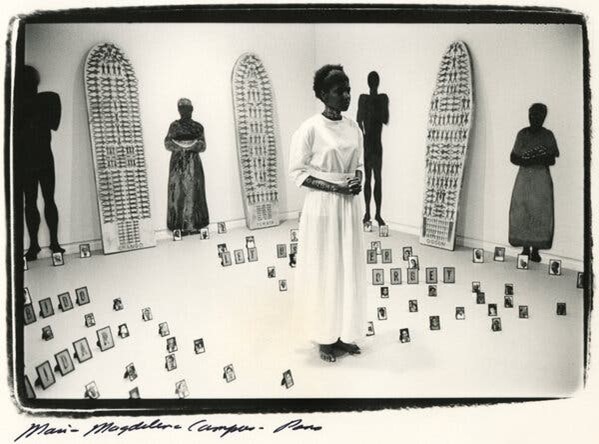
Source: New York Times
Spoken Softly With Mama combines sculpture, photography, and video to “explore her African/Cuban roots and to address themes of gender, race, family and history.” Secrets of the Magnolia Tree is a self-portrait and an “homage to the nurturing role of women, and black women.” “There is no other group of women that has exposed itself to much [sic] pain and suffering and given so much care and love in return,” she says.
Raven Chacon is a Navajo “composer and artist,” who says he is “looking at the histories of different places, the history of the United States, the land that the United States occupies. What kind of violence is being pushed upon the people who live in these places, upon the earth itself?”
His composition “American Ledger No. 1” has “moments of contact, enactment of laws, events of violence, the building of cities, and erasure of land and worldview.” You can watch a performance here. None of the musicians is reading from a score.
“Sweet Land” is “a Manifest Destiny opera . . . opening with the arrival of settler-colonial visitors in the homelands of an Indigenous civilization.”
Voiceless Mass “gives musical form to the church’s history of silencing Indigenous expression and languages.”
Diana Greene Foster is a white woman. She is a demographer and reproductive health researcher who reports that most women who had an abortion were better off because of it. The Atlantic called her work “the single most important piece of academic research in American life at this moment.” The MacArthur people clearly want to tell progressives what they want to hear.
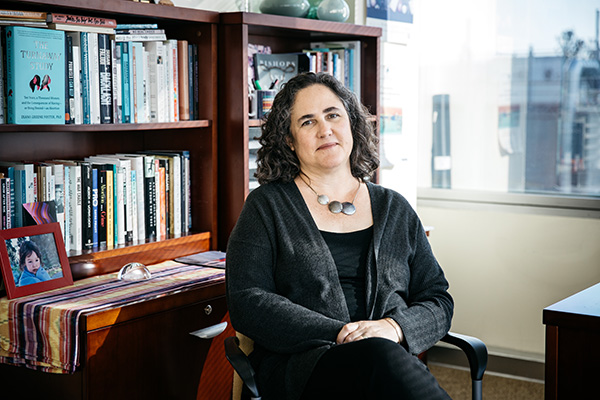
Diane Foster. Credit: © John D. and Catherine T. MacArthur Foundation. CC BY-NC 4.0 DEED.
Carolyn Lazard is an artist who uses objects and machinery to draw “attention to the dependencies and infrastructures of care that sustain social life.” She’s black, so naturally her work “addresses complex histories of institutional harm and racialized violence.” “A Recipe for Disaster” puts text over a film of Julia Child cooking an omelet. Sample text: “This is a white woman cooking.” “Crip Time” may look like someone filling pill bottles, but it’s about rejecting “capitalist notions of worth and value.”
Miss Lazard wrote a guide for nonprofits about physical disabilities, claiming they are “unevenly distributed, primarily affecting black and indigenous communities, queer and trans communities, and low income communities.” They are also “structurally reinforced by ableism.”
She signed a letter calling for the Whitney Museum of American Art to refuse to display and even destroy Open Casket, a painting by a white woman, Dana Schutz, of Emmitt Till in his coffin. It said Miss Schutz must “stop treating Black pain as raw material. . . . The painting must go.”
I think the Whitney should have destroyed it because it’s ugly.
Manuel Muñoz is a college professor author who “render[s] with empathy and vivid detail the multifaceted lives of Mexican American communities in California’s Central Valley.” You can read one of his stories here. The Consequences, his most recent book, “offers powerful meditations on racial, gender, and class tensions.”
What are these meditations? “With an unflinching hand, Muñoz depicts the Mexican and Mexican American farmworkers who put food on our tables but are regularly and ruthlessly rounded up by the migra,” says Gray Wolf Press. (When was the last time you heard of the migra rounding up farmworkers?) Texas Public Radio also says that his characters are “persecuted by the migra.” Datebook says the stories “[give] voice to a segment of the population too often stereotyped, taken advantage of or made invisible by our larger society.”

Manuel Muñoz. Credit: © John D. and Catherine T. MacArthur Foundation. CC BY-NC 4.0 DEED.
Mr. Muñoz is a professional Hispanic: “I know what it means to a lot of first-generation students in my class who come from communities like mine,” he says about being a college professor. “’That’s my professor. His brown face is like my brown face.’ That’s important as they’re growing into awareness of how often they’re not seeing people like them in positions of influence.” He’s homosexual so, of course, he writes about that too.
Mr. Muñoz doesn’t want Hispanics to assimilate: “The corrosive effect of assimilation is the displacement of one culture over another, the inability to sustain more than one way of being.” In modern America, the way to join the ruling class is to emphasize that you are not American.
Patrick Makuaknāne is a kumu hula, or “master teacher” of hula dancing. He also calls himself a “cultural preservationist.” (I’m one, too.)
However, he choreographs hula performances that are not one bit traditional. One piece, called The Natives Are Restless, is “a history of colonialism in and the present occupation of Hawai’i, including the overthrow of the Hawaiian Kingdom and Native Hawaiians’ demand for sovereignty.” Another hula “depicts the devastation Christian missionaries wrought in the nineteenth century.” He calls this “something I have so much contempt for.” Another dance “explores and celebrates the role of gender fluidity in Hawaiian culture and seeks to restore the honor conferred upon transgender people in ancient Hawai’i.”
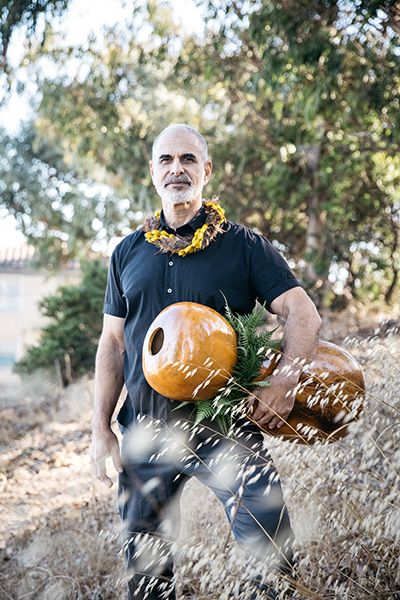
Patrick Makuaknāne. Credit: © John D. and Catherine T. MacArthur Foundation. CC BY-NC 4.0 DEED.
He is homosexual, of course, and incorporates gay rights into his performances. He has also written a hula to attack Donald Trump.
Imani Perry, a black woman and a professor at Princeton, “explores how Black Americans — and often Black women in particular — have resisted, survived, and nonetheless thrived by forging singular paths in the face of oppression and injustice.” More Beautiful and More Terrible “illustrates how people are socialized into racism in the United States through foundational racial narratives.” Vexy Thing: On Gender and Liberation “traces a through-line of modern patriarchy from the Enlightenment and Industrial Revolution to the present and shows how this system of privilege continues to function in digital media and free-market capitalism.”
She recalls being picked up by a white taxi driver, who speaks with a strong accent and mentions he worked in coal mines. Here’s what she says about him. It is worth quoting at length:
He is the man I have known to distrust. He is the one whose race and manhood once (and maybe still) made him my ruler and me his mule. He could kill me then, and if he had a badge, he could kill me now. I tasted venom in my mouth when he spoke. I won’t even say he hadn’t earned it because the odds were good he had. I can guess the words he wouldn’t say to my face but most certainly would say. The fact that some tenderness crept into my chest despite myself made me uncomfortable. I know he has struggled. Just like I know that he thinks I am supposed to struggle more than he does because I’m a Black gal. And that, of course, is the conundrum — I am American. That means something to me, some common ground with others of this soil, even as the country feels irredeemably racist and maybe not worth saving.
In her book Breathe: A Letter to My Sons, she writes, “I have taught you not to love white people.” The New York Times praised the book, saying that though she has seemingly “made it by most standards,” she “cannot guarantee the safety of her offspring because of the color of their skin.”

Imani Perry. Credit: © John D. and Catherine T. MacArthur Foundation. CC BY-NC 4.0 DEED.
Prof. Perry was briefly famous when she was stopped for driving 67 mph in a 45 mph zone and was arrested because she had outstanding parking tickets. She accused police of lying, but would not say how or about what. Dashcam video showed the police scrupulously followed procedure.
Ada Limón is Poet Laureate, the first-ever Mexican-American to get the job. Like most modern poets, her work doesn’t sound like poetry. She’s not always race-obsessed, but sometimes she lets fly. “A New National Anthem” begins with: “The truth is, I’ve never cared for the National Anthem. If you think about it, it’s not a good song.” It complains about the third stanza, which refers to the “hireling and the slave,” which some say is racist because it refers to blacks who fought against the United States in the War of 1812.
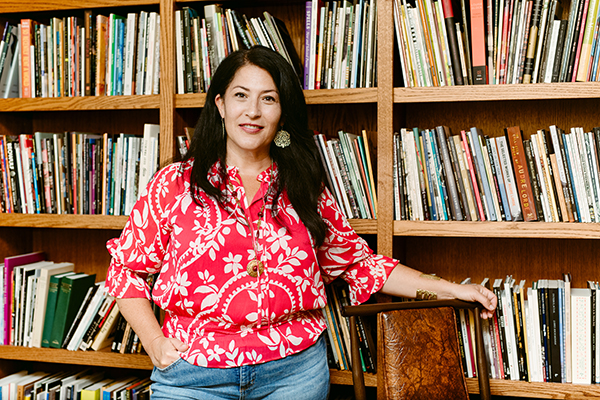
Ada Limón. Credit: © John D. and Catherine T. MacArthur Foundation. CC BY-NC 4.0 DEED.
“Perhaps, the truth is, every song of this country has an unsung third stanza, something brutal snaking underneath us as we blindly sing the high notes with a beer sloshing in the stands hoping our team wins.” That’s poetry for you. She says she likes the flag best when it’s “humbled.” Remember: She is America’s poet laureate.
“The Contract Says: We’d Like the Conversation to be Bilingual” is advice to grant-seekers. It starts like this:
When you come, bring your brown-
ness so we can be sure to pleasethe funders. Will you check this
box; we’re applying for a grant.Do you have any poems that speak
to troubled teens? Bilingual is best.. . . Will you tell us the stories that make
us uncomfortable, but not complicit?
Dyani White Hawk is a “multidisciplinary artist revealing the underrecognized yet enduring influence of Indigenous aesthetics on modern and contemporary art.” She’s a Lakota who makes geometric designs that recall Indian beadwork and quillwork. She claims that the Indians were the pioneers of abstract art. Her purpose is “to encourage conversations that challenge the lack of representation of Native arts, people and voices in our national consciousness while highlighting the truth and necessity of equality and intersectionality.” Some of her paintings are here.’
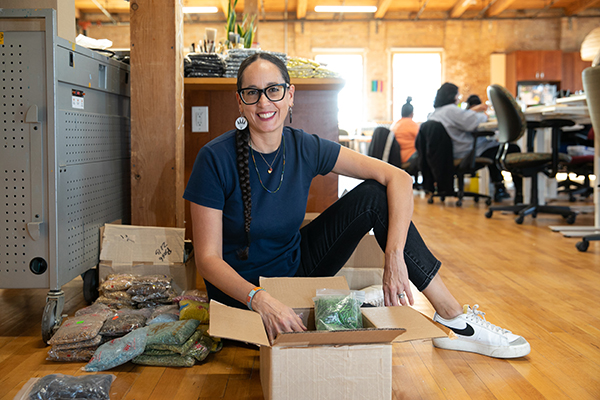
Dyani White Hawk. © John D. and Catherine T. MacArthur Foundation. CC BY-NC 4.0 DEED.
“I Am Your Relative” is nothing but photos of Indian women wearing T-shirts with slogans and tribal names on them. She explains this “art”:
My work is centralized in a Lakota worldview and a Lakota woman’s perspective, but I hope that people see and understand it’s not solely about Native women. . . . [Oppression] cannot be separated. Missing and Murdered Indigenous Women is tied to the issues of Black Lives Matter and ICE. They’re all byproducts of this nation’s history.
She sells earrings and blankets on her website.
I counted only seven “geniuses” who are not obviously anti-white, if not freaks to boot. Anthropologist Amber Wutich studies water insecurity. She is a pretty blonde and looks completely out of place in this lineup. Hydro-climatologist A. Park Williams is worried about climate change. Environmental Engineer Linsey Marr thinks climate change could breed new pathogens. Lucy Hutyra is an environmental ecologist who studies how trees in cities absorb carbon. When MacArthur isn’t slamming white people, it’s saving the planet.
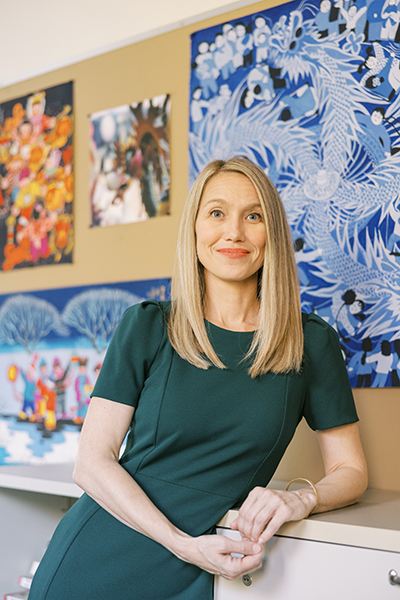
Amber Wutich. © John D. and Catherine T. MacArthur Foundation. CC BY-NC 4.0 DEED.
Meanwhile, statistician Rina Foygel Barber develops “tools to reduce false positives and improve confidence in high-dimensional data models.” Maybe that’s important. Molecular biologist Jason D. Buenrostro, who studies mechanisms that regulate gene expression, also sounds like a serious scholar, but no doubt, being non-white helps. Computer scientist and statistician Lester Mackey is reportedly solving “data science problems with real-world relevance.” I hope so. Another non-white, of course.
How were these “geniuses” chosen? The selection committee is confidential, but of the 12 members on the board of directors, only four are white.
There are 20 “fellows” in the “class of 2023.” Only two are white men. Six are black women, which means that this year, black women were 15 times more likely than white men to be geniuses. Very impressive. There were four white women, which means they were twice as likely as white men to be geniuses. Six whites out of 20 means that non-whites were about four times more likely than whites to be geniuses. This sounds about right for “the current year,” and at 11 to 9, women clearly beat out the men.
Every one of the “artists” is non-white and explicitly anti-white, sometimes grotesquely so. None does anything most of us would consider art.
These 20 people are being honored by one of the world’s wealthiest and most powerful foundations. The awards show us the almost comical extent to which money and institutional power prop up diversity and racial resentment. No doubt, most of them think they are courageously “speaking truth to power.” They’re wrong. They are power’s mascots.















